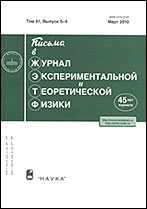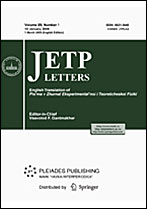|
|
Pis'ma v Zhurnal Èksperimental'noi i Teoreticheskoi Fiziki, 2001, Volume 73, Issue 4, Pages 196–199
(Mi jetpl4319)
|
 |
|
 |
This article is cited in 2 scientific papers (total in 2 papers)
ATOMS, SPECTRA, RADIATIONS
Ion H$_2^+$ can dissociate in a strong magnetic field
A. V. Turbinerab, J.-C. Lópeza, A. Flores-Riverosc
a Instituto de Ciencias Nucleares, UNAM
b Laboratoire de Physique Theorique, Université Paris-Sud 11
c Instituto de Física, Benemérita Universidad Autónoma de Puebla
Abstract:
In framework of a variational method the molecular ion H$_2^+$ in a magnetic field is studied. An optimal form of the vector potential corresponding to a given magnetic field (gauge fixing) is chosen variationally. It is shown that for any magnetic field strength as well as for any orientation of the molecular axis the system $(ppe)$ possesses a minimum in the potential energy. The stable configuration always corresponds to elongation along the magnetic line. However, for magnetic fields $B \gtrsim 5\cdot10^{11}\,$G and some orientations the ion H$_2^+$ becomes unstable decaying to H-atom${} + p$.
Received: 17.10.2000
Citation:
A. V. Turbiner, J.-C. López, A. Flores-Riveros, “Ion H$_2^+$ can dissociate in a strong magnetic field”, Pis'ma v Zh. Èksper. Teoret. Fiz., 73:4 (2001), 196–199; JETP Letters, 73:4 (2001), 176–179
Linking options:
https://www.mathnet.ru/eng/jetpl4319 https://www.mathnet.ru/eng/jetpl/v73/i4/p196
|


|





 Contact us:
Contact us: Terms of Use
Terms of Use
 Registration to the website
Registration to the website Logotypes
Logotypes








 Citation in format
Citation in format 
